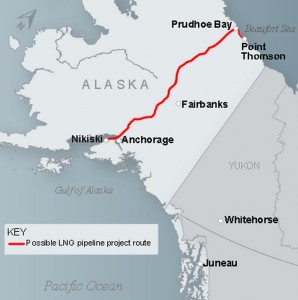
Juneau, Alaska – In hopes of restoring certainty to the Alaska LNG Project, House Speaker Mike Chenault and Senate President Kevin Meyer held multiple meetings over the last six days with Governor Bill Walker to consider a compromise outside of House Bill 132. Those attempts at an agreement on how to move forward on natural gas development fell short today and the Senate passed HB 132.
The legislation affirms the policy direction set by the Legislature for state ownership in the Alaska LNG Project, while protecting nearly $200 million in a reserve account to fund a state alternative if necessary.
“The House passed HB 132, in large part because our members found it unconscionable that we give the governor carte blanche over $200 million to work on a plan they have no details on,” Chenault, R-Nikiski, said. “We, as the Legislature, are the appropriating body. We have a responsibility to Alaskans to be prudent and deliberative in spending the state’s money, and writing a blank check for a plan that we know nothing about and have not vetted in our public process was a non-starter.”
“It is troubling that we could not reach consensus on this issue,” Meyer, R-Anchorage, said. “This is Alaska’s economic future and we are all invested in its success. HB 132 reaffirms the path that we chose, that we vetted, and that we know will provide the maximum benefit to our state. As a legislature, we do not have the level of confidence in the governor’s plan, because one has not been presented to us after repeated requests.”
The legislature offered the following compromise: at Walker’s request, the legislative leaders would have approved and funded a 45-day period in which the governor could assemble a team of his choosing to review the Alaska LNG Project, and determine whether the new administration would need to renegotiate certain contractual terms. Speaker Chenault and President Meyer would have agreed to stop pursuing passage of HB 132. In exchange, they would insert budget language requiring Walker to return to the Legislature with a detailed plan for an alternative gasline project, in order to access the $200 million to fund his unspecified approach. Walker would have had to agree not to veto that budget language.
Discussions concluded when Walker insisted on full access to the $200 million without further legislative approval and refused to provide a detailed project plan.
“We sincerely hope discussions can continue, even with the Senate’s approval of HB 132,” Chenault said. “However, we simply cannot sacrifice public process and fiscal responsibility.”
